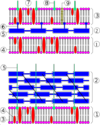Difference between revisions of "Bacterial Structure"
Jump to navigation
Jump to search
| Line 15: | Line 15: | ||
One way bacteria can be classified is by the structure of the cell wall: | One way bacteria can be classified is by the structure of the cell wall: | ||
| − | *'''[[:Category:Gram | + | *'''[[:Category:Gram positive bacteria|Gram-positive bacteria]]''': cell wall consists of peptidoglycan layer, with teichoic polymers attached, e.g. ''Staphylococcus'' |
| − | *'''[[Category:Gram | + | *'''[[:Category:Gram negative bacteria|Gram-negative bacteria]]''':peptidoglycan layer is thinner, but surrounded by outer membrane of lipopolysaccharides and lipoproteins, e.g. salmonella |
[[Image:427px-Arrangement of bacilli bacteria svg.png|thumb|right|100px|Arrangement of bacilli bacteria]] | [[Image:427px-Arrangement of bacilli bacteria svg.png|thumb|right|100px|Arrangement of bacilli bacteria]] | ||
| Line 47: | Line 47: | ||
Another method of classification is the shape and arrangement of the bacteria themselves: | Another method of classification is the shape and arrangement of the bacteria themselves: | ||
| − | *'''[[: | + | *'''[[:Category:Cocci|Cocci]]'''- round shape, e.g. Streptococci, Staphylococci, Neisseria |
| − | *'''[[Category:Rods|Rods]]''' or '''bacilli'''- long shape, e.g. Coliforms, Bacillus, Spirochaetes[[Category:Bacteria]] | + | *'''[[:Category:Rods|Rods]]''' or '''bacilli'''- long shape, e.g. Coliforms, Bacillus, Spirochaetes[[Category:Bacteria]] |
Revision as of 11:23, 17 May 2010
Bacterial genome:
- Contains double-stranded DNA
- Prokaryotic DNA differs to eukaryotic DNA:
- Few repeated sequences
- Most of the DNA is transcribed
- No intervening sequences within structural genes
Cytoplasm:
- Does not contain mitochondria, lysosomes or Golgi bodies (found in eukaryotic cells)
- Contains mesosomes- thought to be primitive endoplasmic reticulum
Surface components:
- Fimbriae- also known as pili, these are hair-like structures that allow bacteria to adhere to each other
- F-type pili- also known as sex pili, these act as conjugation tubes during sexual reproduction
- Capsules/slime- serve to adhere bacteria to cells and provide protection from phagocytosis and dehydration, e.g. hyaluronic acid
- Flagella- help the bacteria move around
One way bacteria can be classified is by the structure of the cell wall:
- Gram-positive bacteria: cell wall consists of peptidoglycan layer, with teichoic polymers attached, e.g. Staphylococcus
- Gram-negative bacteria:peptidoglycan layer is thinner, but surrounded by outer membrane of lipopolysaccharides and lipoproteins, e.g. salmonella
| Component | Gram positive | Gram negative |
|---|---|---|
| Peptidoglycan | Yes | Yes |
| Teichoic acid | Yes | No |
| Lipoprotein | No | Yes |
| Lipopolysaccharide | No | Yes |
| Phospholipid | No | Yes |
Another method of classification is the shape and arrangement of the bacteria themselves:


